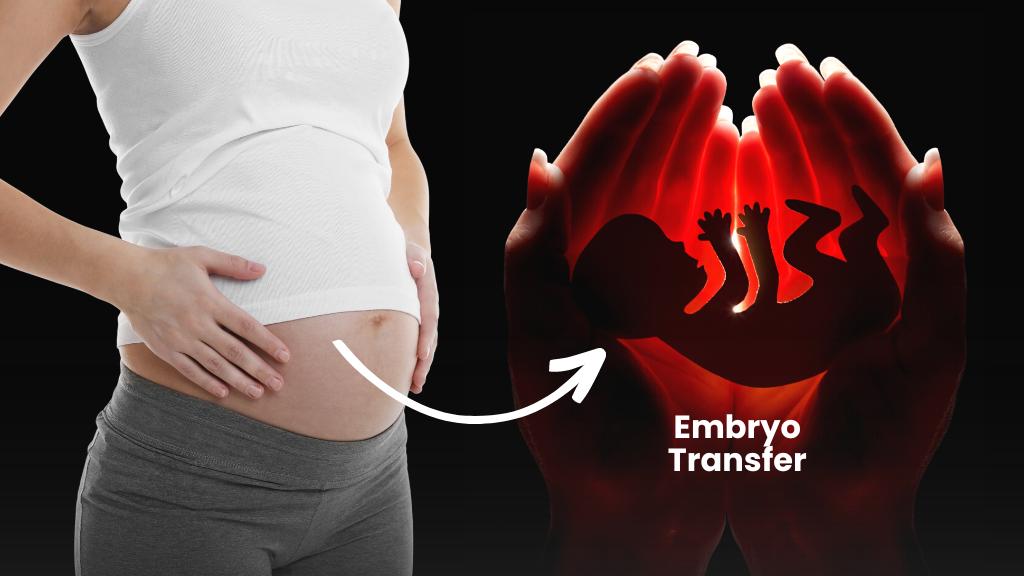
Table of Contents
The day your doctor transfers your embryo into your uterus might look like a fantasy come true. For most people, embryo transfer is one of the most stressful parts of the IVF process. You might feel like you’re on edge afterward, waiting impatiently to see if it was successful.
You might be wondering what you should and shouldn’t do following your embryo transfer. Precautions have very little effect on whether or not you get pregnant after an embryo transfer, though they do play a role in some cases.
We’re here to help you clear a bit of your anxiety. Find out the exact procedure of an embryo transfer, and things to do and not to do before and after the procedure.
But, What is An Embryo Transfer?
The final stage of in vitro fertilization (IVF) is an embryo transfer. Fertility medications are used to encourage the ovaries to produce healthy eggs during IVF. After that, these eggs are taken out of a woman’s ovaries and artificially fertilized. The embryos are moved into the woman’s uterus after the fertilized eggs multiply in a controlled lab setting.
The embryo must then bind to the uterine wall in order for a pregnancy to begin. So when is an embryo transfer necessary? IVF and embryo transfer are required when normal fertilization is impossible or faces issues. There are many explanations behind an embryo transfer such as
- Ovulation disorders: Fewer eggs are available for successful fertilization if ovulation occurs less frequently.
- Damaged Fallopian tubes: The Fallopian tubes are the pathway through which the embryos travel to reach their destination at the uterus. Fertilized eggs will have a difficult time entering the womb if the tubes become damaged or scarred.
- Endometriosis: When uterine tissue grows outside the uterus and implants the female reproductive system may be adversely affected.
- Premature ovarian failure: If the ovaries fail, neither the normal amount of estrogen they produce nor the regular release of eggs is possible.
- Fibrous uteri: On the uterine walls, fibroids are benign, small tumors. They can obstruct an egg’s capacity to establish itself in the uterus, forestalling pregnancy.
- Inherited disorders: It is known that certain genetic disorders may prevent pregnancy.
- Impaired sperm production: Natural fertilization may not work for men if there is low sperm production, poor sperm movement, damage to the testicles, or abnormal sperm.
IVF and embryo transfer may be the only options for anyone who has been diagnosed with these conditions. Did you know that you have to keep your uterus warm after IVF? Tap here to find out how!
Day-by-day Symptoms After Embryo Transfer
What happens after embryo transfer? Your day-to-day symptoms can be discussed with your doctor so make sure you asked these 7 IVF questions on your next appointment. After the embryo transfer procedure, many women may experience the following symptoms on a day-by-day basis:
- Day 1-2: Most women feel normal with no noticeable symptoms.
- Day 3: Some women may experience mild cramping or bloating, similar to menstrual cramps.
- Day 4: The embryo will continue to divide and develop, and some women may begin to experience mild implantation cramping.
- Day 5: The embryo begins to implant in the uterus, and some women may experience implantation bleeding or spotting.
- Day 6-10: As the embryo continues to implant in the uterus, some women may experience fatigue, mild cramping, and bloating.
- Day 11-14: As the embryo grows, some women may experience more noticeable symptoms, including breast tenderness, mood swings, and nausea.
It is important to note that not all women will experience these symptoms, and some women may not experience any symptoms at all. It is also important to talk to your doctor if you experience any severe or concerning symptoms after embryo transfer.
Things You Should Do After Embryo Transfer
Following your embryo transfer, you’ll want to do the things mentioned below.
1. Give Yourself A Break For A Few Days
You just went through a procedure that could change your life! As you celebrate this change and wait for the next step, indulge in some self-care. Give yourself some time to relax and rest because it takes a few days for the embryo to implant itself. If at all possible, you should take some time off, and some experts may even gently suggest that you skip vigorous workouts.
But rest assured you do not need to be on bed rest or lie down constantly. The embryo won’t drop out if you don’t keep your feet up. (Re-read that: We guarantee, the embryo won’t drop out.)
But if you are using that as an excuse to make your partner cut the grass or go grocery shopping… well, that’s our secret! More than a physical health precaution, relaxing can assist with the profound anxiety you might be on. Put down your phone and read. Netflix has some romantic comedies. Watch funny cat videos and laugh. During the wait, all of this can be important for self-care.
2. Maintain Your Medication Regimen
It may be tempting to discontinue the medication you were taking before the transfer, but you should never do so without consulting your physician first. Most women need to continue to take progesterone in the early weeks after the embryo transfer to allow their pregnancy the best opportunity to proceed.
Because progesterone is a crucial hormone for maintaining a pregnancy, it is frequently used in IVF and assisted reproduction. It assists the embryo with embedding (and remaining embedded) in the uterus. Yes, we are aware that the progesterone vaginal injections and suppositories are irritating but hang in there. If you’re taking them after your exchange, it’s for a good explanation.
Another drug that your doctor could suggest that you take is baby aspirin. According to research, taking a low dose of aspirin can improve your chances of implantation and pregnancy.
A study of 60 women, for instance, found that those who underwent a frozen-thawed embryo transfer (FET) had better outcomes with aspirin therapy. By the way, more research is required here because ibuprofen isn’t appropriate for everybody. We are stating the following: Keep taking it until you are told to stop if your doctor wants you to.
3. Maintain A Healthy Diet
If everything goes according to plan, you will have a tiny human inside you for the next nine months. This is an incredible opportunity to embrace the good dieting meal plans that specialists suggest for pregnant ladies.
A variety of fruits and vegetables, as well as foods high in iron, B vitamins, calcium, and protein, are ideal. But go ahead and include a prenatal vitamin in your routine even if you eat well.
4. Start Taking A Folic Acid Supplement Daily
If you haven’t already, now is the time to start! When you’re pregnant, taking folic acid has many benefits. You want 400 mcg of this significant B nutrient to forestall brain tube absconds.
According to a 2015 review of studies, taking folic acid from the mother is also linked to a lower risk of congenital heart defects in babies. Additionally, folic acid may reduce your baby’s risk of developing cleft lip or palate. Your prenatal vitamin will typically contain all of the required folic acids.
Note: Be sure to ask your doctor if you need to take more if you have had a previous pregnancy or a child with a neural tube defect.
5. Pay Attention To Chemicals That Disrupt The Endocrine System
Start paying close attention to the things you use at home and in the gym. You must try to avoid using products that contain substances like
- Phthalates
- Bisphenol A (BPA)
- Triclosan
- Parabens, etc.
At least try to reduce the amount of time you spend in contact with these substances. Chemicals that disrupt the endocrine system are known as EDCs. They have the potential to disrupt the normal function of hormones in your body. The Endocrine Society says that some EDCs can cross the placenta and get concentrated in the bloodstream of your baby at a very important stage in their development.
Even in utero, these chemicals may impede your baby’s organ development. Afterward, early exposure to elevated degrees of these synthetic substances might cause other formative disorders. Therefore, if you are looking for a new water bottle, try to find one with a label stating that it is free of BPA. Additionally, check the sunscreen label to ensure that it does not contain EDCs.
Things You Shouldn't Do After Embryo Transfer
Obviously, there are a couple of things you should avoid after embryo transfer. These precautions will give your embryo a great environment to thrive.
1. Do Not Have Sex
Research suggests that a brief period of pelvic rest is best after an embryo transfer. Why? Sexual activity can cause your uterus to contract, which can cause the embryo that was just transferred into your body to be disrupted. Assuming the worst: It could keep the embryo from embedding in your uterus or lead to unsuccessful labor. Don’t stress. This will only be a brief respite.
2. Do Not Take A Pregnancy Test Immediately
The impulse to pee on a stick immediately will be enormous. From the day of the transfer, it may take a few weeks before a blood test can detect enough human chorionic gonadotropin (hCG) produced by the placenta cells. Mark the days off on your schedule until you can get back to your doctor’s office, and they can run a test to affirm the pregnancy.
3. Do Not Neglect Troubling Symptoms
You should probably be on the lookout for certain symptoms that might appear in the days after embryo transfer. Women who take fertility medications might foster a condition called ovarian hyperstimulation disorder (OHSS). When your body reacts strongly to the hormones that were injected into you as part of the IVF process, OHSS may occur. OHSS can result in the following symptoms:
- Abdominal pain
- Bloating
- Nausea
- Vomiting
- Diarrhea
If you have a serious case, these symptoms can get worse quickly. On the off chance that you unexpectedly put on some weight or feel serious agony in your gut, don’t fret. Tell your doctor about your symptoms so they can help you decide what to do next.
What’s The Takeaway?
In the days following your embryo transfer, you are playing the waiting game. While it’s really smart to take care to support your pregnancy, the majority of what you do does not really affect your health. Nevertheless, finding a few low-key activities to keep you occupied while you wait might help you pass the time. You’ll be waiting for the results of your first post-transfer pregnancy test in the doctor’s office before you know it.









